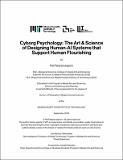Cyborg Psychology: The Art & Science of Designing Human-AI Systems that Support Human Flourishing
Author(s)
Pataranutaporn, Pat
DownloadThesis PDF (77.42Mb)
Advisor
Maes, Pattie
Terms of use
Metadata
Show full item recordAbstract
As Artificial Intelligence (AI) becomes increasingly integrated into our daily lives, understanding the psychological implications of human-AI interaction is crucial for developing systems that truly support human capabilities. This dissertation introduces “Cyborg Psychology,” an interdisciplinary, human-centered approach to understanding how AI systems influence human psychological processes. Cyborg Psychology also emphasizes applying these insights to design and develop AI systems that support human flourishing. Cyborg Psychology recognizes the complex, non-linear interactions between humans and AI, acknowledging that both can influence and shape each other in dynamic and often unpredictable ways. Informed by human-computer interaction, psychology, and behavioral sciences, this dissertation focuses on understanding AI’s impact on crucial cognitive and behavioral processes, including motivation, critical thinking, self-reflection, confidence, beliefs, biases, and more. In addition, the work presents several AI systems that apply psychological insights to support human cognition and behavior. For example, the “Wearable Reasoner” seeks to enhance human rationality, “Personalized Virtual Characters” aims to support learning motivation, and “Future You” is designed to encourage long-term oriented thinking and behavior. Employing a diverse array of research methodologies, this work proposes a framework for investigating the implications of interaction design choices. The ultimate goal is to empower the development of AI systems that foster human flourishing by nurturing intellectual growth, cultivating motivation, stimulating critical thinking, and preserving individual autonomy in decision-making.
Date issued
2024-09Department
Program in Media Arts and Sciences (Massachusetts Institute of Technology)Publisher
Massachusetts Institute of Technology